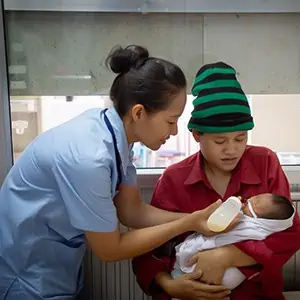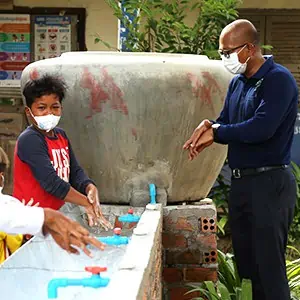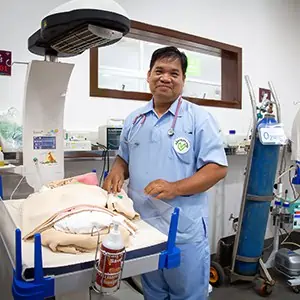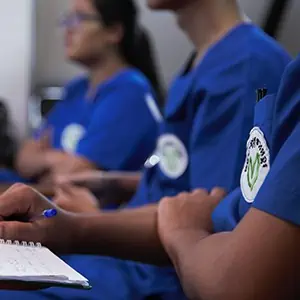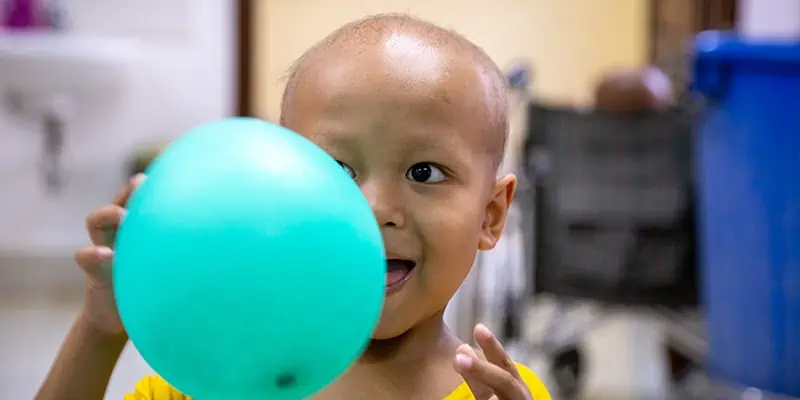Sangha, a 3-year old boy from Kampot province, was admitted to AHC on the final day of 2019.
His mother, Dary, had been concerned by her son’s continual fever that he developed in November that same year. After a month of increasing symptoms, Sangha’s condition had not improved. During that time, they made multiple visits to private clinics who prescribed courses of antibiotics for a presumed bacterial infection. Dary was becoming increasingly worried so decided to take her son to the National Paediatric Hospital in Phnom Penh. Tests revealed Sangha to be showing signs of cancer. Doctors there advised it would be best for them to seek care at AHC’s Oncology unit.
On New Year’s Eve, Sangha arrived at AHC and the diagnosis was confirmed. A blood test showed a high white cell count and low platelet and haemoglobin count, a sign of ALL (acute lymphoblastic leukaemia). Currently, AHC is the only facility in Cambodia treating ALL, one of the most common cancers found in children. ALL is a type of cancer of the blood and bone marrow that progresses rapidly and creates immature blood cells, rather than mature ones.
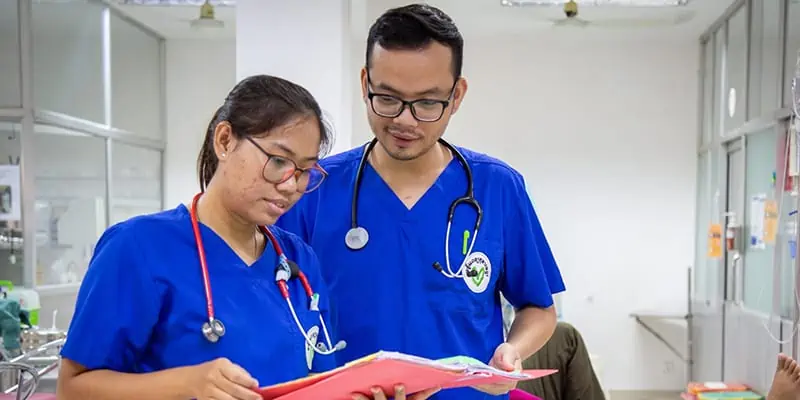
AHC oncology fellows, Dr Korb Sreynich and Dr Samly Vannak, are leading the treatment of AHC’s oncology patients, making them two of only a handful of local specialist paediatric oncologists in Cambodia. With expert guidance from specialists around the world, like long time volunteers Dr Bruce M. Camitta from Wisconsin Children’s Hospital and Dr Leslie Kean from Harvard Medical School, AHC is building up local paediatric oncology expertise. The specialist paediatric oncology team at AHC is one of a kind in Cambodia.
Chemotherapy treatment of ALL is split into five phases over the course of three years. For Sangha and Dary, this would mean an eight-hour, one-way bus journey every month from their home in Kampot to Siem Reap, a $50 USD round trip. It would also mean extended stays at the hospital, both sleeping in the Oncology unit where AHC provides accommodation, as Sangha received treatment. After six months of treatment, Sangha and Dary would spend over two months collectively at the hospital.
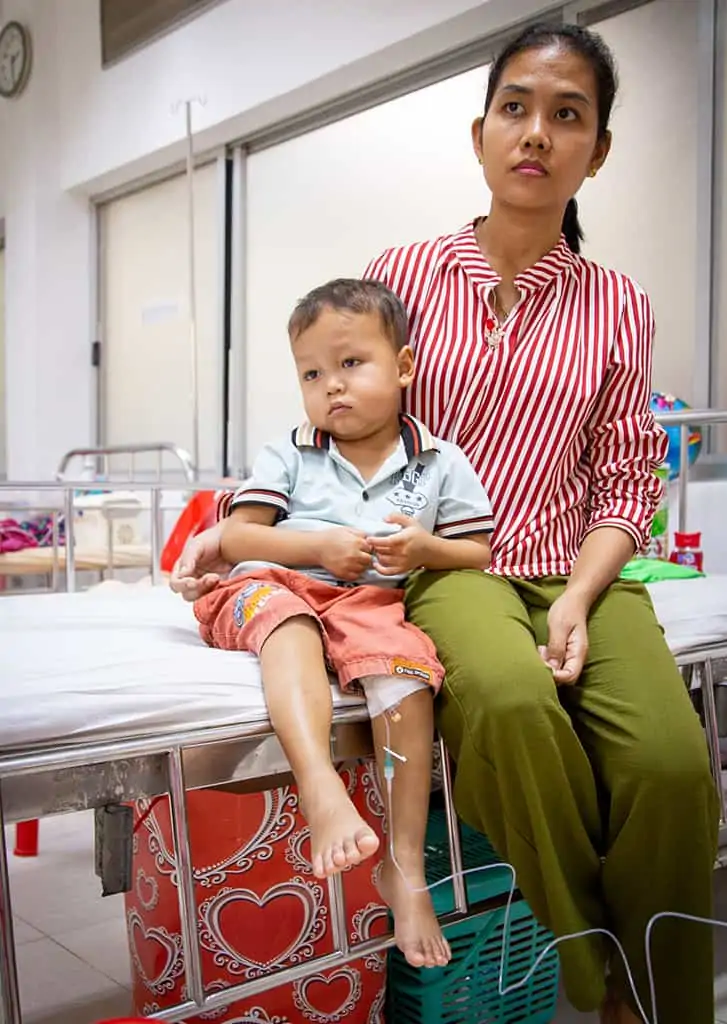
During the second phase of treatment, known as the ‘induction’ phase, Sangha received high dosage chemotherapy treatment for a 30-day period, including intrathecal spinal injections. This treatment caused Sangha severe bouts of nausea, weight loss, trouble sleeping, and eventual loss of his hair, which is rare for this form of chemotherapy treatment. Sangha also needed multiple blood transfusions during this phase because of his low blood count.“My son was very upset at this time,” says Dary, “It was hard to watch him as he became skinny and weak.”
After three months of less intensive chemotherapy treatment (once every 10 days) during the intensification phase, Sangha’s cancer was showing signs of remission. A bone marrow sample was sent to Seattle Children’s Hospital and returned a MRD (Minimum Residual Disease) result of <0.02%, compared to 79% when he was first tested, which is within the levels a healthy child should be. This meant Sangha could progress to the next phase of treatment, the ‘reinduction’ phase.
AHC’s ALL programme has been specifically designed for a low-resource setting. ALL patients at AHC undergo an additional induction phase of intensive chemotherapy treatment after they have completed the intensification phase. Whereas an ALL patient in the developed world would not need this additional month of intensive treatment. This is because chemotherapy medications available in modern healthcare systems are much more powerful than the medications available in Cambodia. Sangha and Dary would end up spending this entire month of ‘reinduction’ at AHC, experiencing further nausea, pain, and other symptoms of chemotherapy. “We were lucky to have the support of the other families staying at the hospital receive the same care,” says Dary, “It became our home away from home.”
sangha-post-treatment
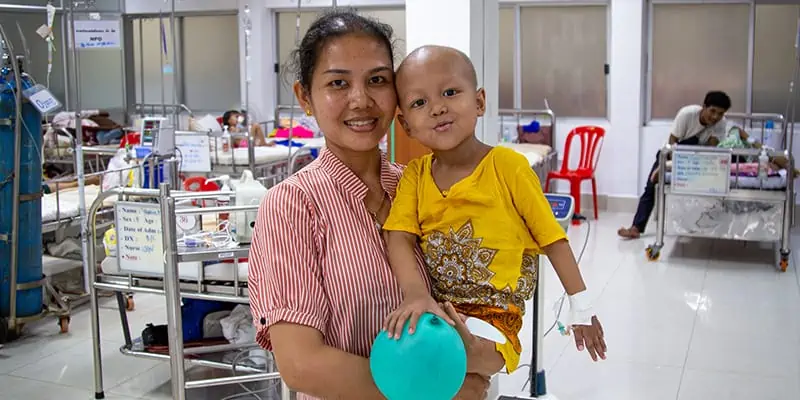
AHC introduced ALL treatment two years ago and the programme was designed with support from oncology experts at Wisconsin Children’s Hospital, Seattle Children’s Hospital, Boston Children’s Hospital, and St Jude’s Children’s Research Hospital. Every week AHC’s oncology team teleconference with these same experts to discuss the cancer cases at AHC. Since the programme began, AHC has started treating over 20 ALL patients, none of whom has yet completed the long course of treatment.
Today, Sangha has entered the final ‘continuation’ phase of treatment. However, this final phase consists of over two years of daily chemotherapy treatment at home, with monthly visits to AHC for follow up treatment, and intrathecal spinal injections every three months. Sangha’s prognosis is promising; with a 90% probability, his cancer will be cured. “I know we still have a long road ahead of us, but I can already see a big difference in my son,” says Dary, “because of treatment he has been allowed to be a kid again.”
